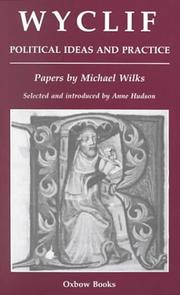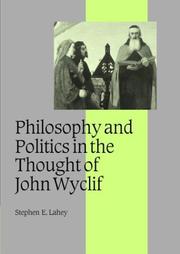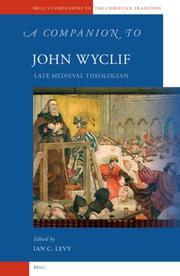| Listing 1 - 10 of 27 | << page >> |
Sort by
|
Book
ISBN: 8884500346 Year: 2003 Publisher: Firenze Sismel
Abstract | Keywords | Export | Availability | Bookmark
 Loading...
Loading...Choose an application
- Reference Manager
- EndNote
- RefWorks (Direct export to RefWorks)
Wycliffe, John, --- Vicliffe, John, --- Viklef, Jan, --- Viklef, John, --- Viklif, Jan, --- Wickliffe, John, --- Wiclif, Johann von, --- Wiclif, John, --- Wicliffe, John, --- Wyclif, John, --- Wyclyf, John, --- Wykliffe, Johannes von,
Book
ISBN: 9780754659648 Year: 2008 Volume: 907 Publisher: Aldershot Burlington Ashgate
Abstract | Keywords | Export | Availability | Bookmark
 Loading...
Loading...Choose an application
- Reference Manager
- EndNote
- RefWorks (Direct export to RefWorks)
Réforme --- Wycliffe, John, --- Reformation --- Pre-Reformation --- Christian sects, Medieval --- Church history --- Early movements --- Vicliffe, John, --- Viklef, Jan, --- Viklef, John, --- Viklif, Jan, --- Wickliffe, John, --- Wiclif, Johann von, --- Wiclif, John, --- Wicliffe, John, --- Wyclif, John, --- Wyclyf, John, --- Wykliffe, Johannes von, --- Réforme protestante --- Réforme protestante. --- Wyclif, John. --- Joannes Wyclif --- Joannis Wiclif --- Wycliffe, John

Abstract | Keywords | Export | Availability | Bookmark
 Loading...
Loading...Choose an application
- Reference Manager
- EndNote
- RefWorks (Direct export to RefWorks)
Political science --- Administration --- Civil government --- Commonwealth, The --- Government --- Political theory --- Political thought --- Politics --- Science, Political --- Social sciences --- State, The --- Wycliffe, John, --- Vicliffe, John, --- Viklef, Jan, --- Viklef, John, --- Viklif, Jan, --- Wickliffe, John, --- Wiclif, Johann von, --- Wiclif, John, --- Wicliffe, John, --- Wyclif, John, --- Wyclyf, John, --- Wykliffe, Johannes von, --- Political and social views.
Book
ISBN: 3111344398 9783111344393 9027931569 9789027931566 311192646X Year: 1977 Publisher: The Hague : Mouton,
Abstract | Keywords | Export | Availability | Bookmark
 Loading...
Loading...Choose an application
- Reference Manager
- EndNote
- RefWorks (Direct export to RefWorks)
Preaching --- English language --- Sermons, Medieval --- Sermons, English (Middle) --- English sermons, Middle --- Middle English sermons --- Sermons, English --- Sermons, Middle English --- English prose literature --- History --- Style. --- History and criticism. --- Wycliffe, John, --- Vicliffe, John, --- Viklef, Jan, --- Viklef, John, --- Viklif, Jan, --- Wickliffe, John, --- Wiclif, Johann von, --- Wiclif, John, --- Wicliffe, John, --- Wyclif, John, --- Wyclyf, John, --- Wykliffe, Johannes von, --- Literary style. --- Germanic languages
Book
ISBN: 9780195183313 9780195183320 0195183312 0195183320 Year: 2009 Publisher: Oxford Oxford university press
Abstract | Keywords | Export | Availability | Bookmark
 Loading...
Loading...Choose an application
- Reference Manager
- EndNote
- RefWorks (Direct export to RefWorks)
John Wyclif (d.1384) has too frequently been described as "Morning Star of the Reformation" and only recently begun to be studied as a fourteenth-century English philosopher and theologian. This work draws on recent scholarship situating Wyclif in his fourteenth-century milieu to present a survey of his thought and writings as a coherent theological position arising from Oxford's "Golden Age" of theology.Lahey argues that many of Wyclif's best known critiques of the fourteenth-century Church arise from his philosophical commitment to an Augustinian realism evocative of the thought of Robert Grosseteste and Anselm of Canterbury. This realism is comprehensible in terms of Wyclif's sustained focus on semantics and the properties of terms and propositions, a "linguistic turn" characterizing post-Ockham philosophical theology. Arising from this propositional realism is a strong emphasis on the place of Scripture in both formal and applied theology, which was the starting point for many of Wyclif's quarrels with the ecclesiastical status quo in late fourteenth-century England.This survey takes into account both Wyclif's earlier, philosophical works and his later works, including sermons and Scripture commentary. Wyclif's belief that Scripture is the eternal and perfect divine word, the paradigm of human discourse and the definitive embodiment of truth in creation is central to an understanding of the ties he believes relate theoretical and practical philosophy to theology. This connection links Wyclif's interest in the propositional structure of reality to his realism, his hermeneutic program, and to his agenda for reform of the Church. Lahey's survey also highlights Wyclif's rejection of Bradwardine's determinism in favor of a model of human freedom in light of God's perfect foreknowledge, and also explores the relation of Wyclif's spatiotemporal atomism to his rejection of transubstantiation. This is the first book-length, comprehensive survey of Wyclif's thought, and will be of interest to students of later medieval theology, philosophy, history, and literature.
284.3 --- 284.3 Hussieten. Hus. Wycliff. Taborieten. Calixtenen. Utramquisten. Horebieten --- Hussieten. Hus. Wycliff. Taborieten. Calixtenen. Utramquisten. Horebieten --- Wycliffe, John, --- Vicliffe, John, --- Viklef, Jan, --- Viklef, John, --- Viklif, Jan, --- Wickliffe, John, --- Wiclif, Johann von, --- Wiclif, John, --- Wicliffe, John, --- Wyclif, John, --- Wyclyf, John, --- Wykliffe, Johannes von, --- Christianity
Book
ISBN: 178204339X Year: 2014 Publisher: Woodbridge : Boydell Press published for Royal Historical Society,
Abstract | Keywords | Export | Availability | Bookmark
 Loading...
Loading...Choose an application
- Reference Manager
- EndNote
- RefWorks (Direct export to RefWorks)
New investigation of John Wyclif's writings on the theory of the "just war" shows him to be the first genuine pacifist of medieval Europe. John Wyclif (c. 1330-84) was the foremost English intellectual of the late fourteenth century and is remembered as both an ecclesiastical reformer and a heresiarch. But, against the backdrop of the Hundred Years War, Wyclif also tackled the numerous ethical, legal and practical problems arising from war and violence. Since the fifth-century works of St Augustine of Hippo, Christian justifications of war had revolved around three key criteria: just cause, proper authority and correct intention. Utilising Wyclif's extensive Latin corpus, the author traces how and why Wyclif dismantled these three pillars of medieval just war doctrine, exploring his critique within the context oflate medieval political thought and theology. Wyclif is revealed to be a thinker deeply concerned with the Christian virtues of sacrifice, suffering and charity, which ultimately led him to repudiate the concept of justified warfare in both theory and practice. The author thus changes the way we understand Wyclif, demonstrating that he created a coherent doctine of pacifism and non-resistance which was at that time unparallelled. Dr Rory Cox isa Lecturer in Late Mediaeval History at the University of St Andrews.
Wycliffe, John, --- Vicliffe, John, --- Viklef, Jan, --- Viklef, John, --- Viklif, Jan, --- Wickliffe, John, --- Wiclif, Johann von, --- Wiclif, John, --- Wicliffe, John, --- Wyclif, John, --- Wyclyf, John, --- Wykliffe, Johannes von, --- Just war doctrine --- HISTORY / Medieval. --- John Wyclif. --- Rory Cox. --- charity. --- just war theory. --- late medieval political thought. --- medieval Europe. --- pacifism. --- sacrifice. --- theology. --- History. --- War --- Religious aspects. --- Political and social views.
Book
ISBN: 0709927355 Year: 1982 Publisher: London Croom Helm
Abstract | Keywords | Export | Availability | Bookmark
 Loading...
Loading...Choose an application
- Reference Manager
- EndNote
- RefWorks (Direct export to RefWorks)
Historical linguistics --- English language --- Grammar --- anno 500-1499 --- -English language --- -Sermons, English --- -English sermons --- Germanic languages --- Complement --- Syntax --- Criticism, Textual --- Wycliffe, John --- -Language --- -Complement --- -Joannes Wyclif --- Joannis Wiclif --- Language --- Sermons, English (Middle) --- Sermons, Medieval --- English sermons, Middle --- Middle English sermons --- Sermons, English --- Sermons, Middle English --- English prose literature --- Wycliffe, John, --- Vicliffe, John, --- Viklef, Jan, --- Viklef, John, --- Viklif, Jan, --- Wickliffe, John, --- Wiclif, Johann von, --- Wiclif, John, --- Wicliffe, John, --- Wyclif, John, --- Wyclyf, John, --- Wykliffe, Johannes von, --- Language. --- Medieval sermons

ISBN: 0851159958 Year: 2003 Publisher: Woodbridge ; Rochester, NY : Boydell Press,
Abstract | Keywords | Export | Availability | Bookmark
 Loading...
Loading...Choose an application
- Reference Manager
- EndNote
- RefWorks (Direct export to RefWorks)
Lollards --- Wycliffe, John, --- England --- Angleterre --- Church history --- Histoire religieuse --- 27 <420> "10/14" --- 284.3 --- 289.921 --- Poor priests --- Wiclifites --- Wyclifites --- Kerkgeschiedenis--Engeland--?"10/14" --- Hussieten. Hus. Wycliff. Taborieten. Calixtenen. Utramquisten. Horebieten --- Lollarden --- Wycliffe, John --- -27 <420> "10/14" --- 289.921 Lollarden --- 284.3 Hussieten. Hus. Wycliff. Taborieten. Calixtenen. Utramquisten. Horebieten --- Joannes Wyclif --- Joannis Wiclif --- -Lollards --- Vicliffe, John, --- Viklef, Jan, --- Viklef, John, --- Viklif, Jan, --- Wickliffe, John, --- Wiclif, Johann von, --- Wiclif, John, --- Wicliffe, John, --- Wyclif, John, --- Wyclyf, John, --- Wykliffe, Johannes von,

ISBN: 052163346X 0521058465 0511117140 0511066163 051105985X 0511308574 0511496540 1280160047 1139145908 0511068298 9780521633468 9780511066160 9780511068294 9780511059858 9780511496547 9780521058469 9786610160044 661016004X Year: 2003 Volume: 54 Publisher: Cambridge, U.K. ; New York : Cambridge University Press,
Abstract | Keywords | Export | Availability | Bookmark
 Loading...
Loading...Choose an application
- Reference Manager
- EndNote
- RefWorks (Direct export to RefWorks)
John Wyclif was the fourteenth-century English thinker responsible for the first English Bible, and for the Lollard movement which was persecuted widely for its attempts to reform the Church through empowerment of the laity. Wyclif had also been an Oxford philosopher, and was in the service of John of Gaunt, the powerful duke of Lancaster. In several of Wyclif's formal, Latin works he proposed that the king ought to take control of all Church property and power in the kingdom - a vision close to what Henry VIII was to realize 150 years later. This book argues that Wyclif's political programme was based on a coherent philosophical vision ultimately consistent with his other reformative ideas, identifying a consistency between his realist metaphysics and his political and ecclesiological theory.
Church and state --- History --- Wycliffe, John, --- -Christianity and state --- Separation of church and state --- State and church --- State, The --- -Wycliffe, John --- -Joannes Wyclif --- Joannis Wiclif --- Wycliffe, John --- Contributions in doctrine of church and state --- Christianity and state --- Vicliffe, John, --- Viklef, Jan, --- Viklef, John, --- Viklif, Jan, --- Wickliffe, John, --- Wiclif, Johann von, --- Wiclif, John, --- Wicliffe, John, --- Wyclif, John, --- Wyclyf, John, --- Wykliffe, Johannes von, --- Arts and Humanities --- Church and state - England - History - To 1500. --- Wycliffe, John, - d. 1384. --- Contributions in doctrine of church and state.

ISSN: 18716377 ISBN: 9004150072 9789004150072 9786611399092 1281399094 9047409051 9789047409052 9781281399090 6611399097 Year: 2006 Volume: 4 Publisher: Leiden ; Boston : Brill,
Abstract | Keywords | Export | Availability | Bookmark
 Loading...
Loading...Choose an application
- Reference Manager
- EndNote
- RefWorks (Direct export to RefWorks)
The Companion to John Wyclif contains eight substantial essays covering the central aspects of John Wyclif's life and thought. The volume's authors have drawn on an extensive amount of primary material, as well as the most recent secondary sources, so as to present a comprehensive picture of Wyclif in his times. Topics covered include a detailed life and career of Wyclif, and close analyses of his logic and metaphysics; doctrine of the Trinity and Christology; political views; Christian life and piety; sacraments; the Bible; and an examination of his medieval opponents. Experts and students alike will profit from these in-depth studies all of which provide a view of Wyclif in his late medieval context. For those not already familiar with Wyclif this volume will serve as an excellent introduction; and those with greater expertise will find fresh appraisals which may, in turn, lead to further research.
Religious leaders --- Reformation --- Chefs religieux --- Réforme (Christianisme) --- Biography. --- Early movements. --- Biographies --- Origines --- Wycliffe, John, --- -Reformation --- -284.3 --- Protestant Reformation --- Church history --- Counter-Reformation --- Protestantism --- Spiritual leaders --- Persons --- Early movements --- Hussieten. Hus. Wycliff. Taborieten. Calixtenen. Utramquisten. Horebieten --- History --- Viklef, Jan, --- Viklef, John, --- Viklif, Jan, --- Wickliffe, John, --- Wiclif, Johann von, --- Wiclif, John, --- Wicliffe, John, --- Wyclif, John, --- Wyclyf, John, --- Wykliffe, Johannes von, --- 284.3 Hussieten. Hus. Wycliff. Taborieten. Calixtenen. Utramquisten. Horebieten --- Vicliffe, John, --- Réforme (Christianisme) --- 284.3 --- Pre-Reformation --- Christian sects, Medieval --- Religious leaders - Biography --- Reformation - Early movements --- Wycliffe, John, - -1384
| Listing 1 - 10 of 27 | << page >> |
Sort by
|

 Search
Search Feedback
Feedback About UniCat
About UniCat  Help
Help News
News